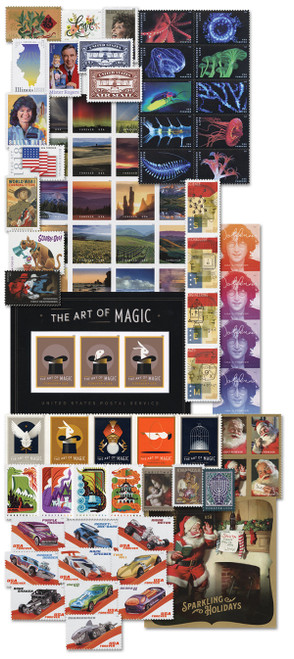
2018 First-Class Forever Stamp,Madonna and Child by Bachiacca
# 5331 - 2018 First-Class Forever Stamp - Madonna and Child by Bachiacca
$0.35 - $69.00
U.S. #5331
2018 50¢ Madonna and Child by Bachiacca
Value: 50¢ 1-ounce First-Class Rate (Forever)
Issue Date: October 3, 2018
First Day City: Santa Fe, NM
Type of Stamp: Definitive
Printed by: Banknote Corporation of America
Printing Method: Offset, Microprint
Format: Double-sided Booklet of 20
Self-Adhesive
Quantity Printed: 300,000,000
Bachiacca (1494-1557) was a leading Mannerist artist of the Italian Renaissance, recognized for his ability to capture nature.
Born Francesco d'Ubertino Verdi, Bachiacca came from a family of artists. He apprenticed under Pietro Perugino, who also taught Raphael. Early in his career, Bachiacca painted large altarpieces before being hired as an artist in the court of Duke Cosimi I de 'Medici.
Bachiacca is largely credited with helping to evolve Mannerism, a late Renaissance style recognized by its exaggerated proportions and surreal elegance. Bachiacca was renowned for his detailed paintings of plants and animals. In paintings such as Madonna and Child, he included flowers with specific meanings. The baby Jesus is shown grasping a sprig of jasmine. Jasmine often represents Mary because the flower grows in May, which is known as the month of Mary. The other flowers in the painting – cornflower, rose, and sweetbriar – are all representative of Jesus and Mary as well.
Bachiacca's paintings were also interesting for the way they incorporated inspiration from different sources. It was common at the time for works to be based on those of others. But Bachiacca had a natural ability to take inspiration from Italian, German, and Netherlandish sources. He could merge them into a single unique piece, standing out from the artists of the day.
U.S. #5331
2018 50¢ Madonna and Child by Bachiacca
Value: 50¢ 1-ounce First-Class Rate (Forever)
Issue Date: October 3, 2018
First Day City: Santa Fe, NM
Type of Stamp: Definitive
Printed by: Banknote Corporation of America
Printing Method: Offset, Microprint
Format: Double-sided Booklet of 20
Self-Adhesive
Quantity Printed: 300,000,000
Bachiacca (1494-1557) was a leading Mannerist artist of the Italian Renaissance, recognized for his ability to capture nature.
Born Francesco d'Ubertino Verdi, Bachiacca came from a family of artists. He apprenticed under Pietro Perugino, who also taught Raphael. Early in his career, Bachiacca painted large altarpieces before being hired as an artist in the court of Duke Cosimi I de 'Medici.
Bachiacca is largely credited with helping to evolve Mannerism, a late Renaissance style recognized by its exaggerated proportions and surreal elegance. Bachiacca was renowned for his detailed paintings of plants and animals. In paintings such as Madonna and Child, he included flowers with specific meanings. The baby Jesus is shown grasping a sprig of jasmine. Jasmine often represents Mary because the flower grows in May, which is known as the month of Mary. The other flowers in the painting – cornflower, rose, and sweetbriar – are all representative of Jesus and Mary as well.
Bachiacca's paintings were also interesting for the way they incorporated inspiration from different sources. It was common at the time for works to be based on those of others. But Bachiacca had a natural ability to take inspiration from Italian, German, and Netherlandish sources. He could merge them into a single unique piece, standing out from the artists of the day.









